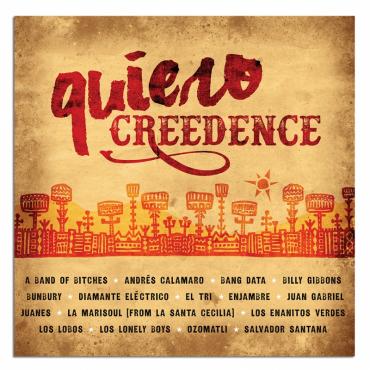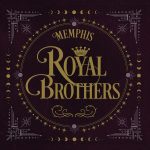
It’s Creedence as you’ve never heard them-at least not in this country. This Latin tribute to CCR features a bevy of Latin artists including Los Lobos, Los Lonely Boys and Ozomatli as well as ZZ Top’s Billy Gibbons teamed up with Grammy winning Latin artist La Marisoul, lead singer of the L.A.- based La Santa Cecilia band. The fourteen selections are taken from Credence Clearwater Revival cuts from ’69- ’71, shaken, stirred, and blended into a potent South of the Border cocktail.
Los Lobos ‘ cover of “Bootleg” is almost identical to Fogerty’s 1969 original from Green River, just punched up and slowed down a bit. But Rojas and company lay down a swampier vibe than Fogerty’s, putting in a hint of menace that makes you want to keep looking over your shoulder.
Juan Gabriel is a Mexican superstar, selling over 20 million records of his own and writing hit songs for a bevy of International stars. His cover of “Have You Ever Seen The Rain” closely follows CCR’s ’71 hit, but sung in Spanish and sweetened a bit with violins.
Los Lonely Boys’ take on “Born On The Bayou” is a near clone of Fogerty’s ’69 hit that backed “Proud Mary” on the 45, with the exception of some bow-wow box guitar added in the middle and a bit of Hendrix psychedelia stirred in. But the Boys sneak in a little tongue in cheek humor the second time the reference to Fogerty’s hound dog comes around, making it a Chihuahua barking down a hoodoo there.
“Feelin’ Blue,” from ’69s Willie And The Poor Boys album, gets a complete makeover from the Band of Bitches, who describe their music as soft porn rock. But what you get here is hip-hop Tex-Mex with violins and a funky backbeat that transforms the song from a bluesy slog to a prancing party anthem.
Ozomatli might as well have called their contribution “Bad Mon Rising.” Splicing a ’70’s era- reggae soundtrack on ’69’s “Bad Moon Rising” with syncopated horn bleats, scat singing and a lively riddum section bouncing around on the off beat takes this one out of the jungle and onto the dance floor.
Enjambre’s vision of ’70s “Who’ll Stop The Rain” (Cosmo’s Factory) is a dreamy, slightly psychedelic rendition that sounds like it might have been recorded looking out of steamy window at an endless Monsoon season.
Argentinian singer Andres Calamaro’s vocal on his cover of “Long As I Can See The Light” is gospel-inflected soul, but the arrangement is country, with some interesting confusion added by a churchy organ that can’t seem to decide if it wants to be mounted on the back of a pickup or bellowing majestically in a sanctuary.
If you haven’t heard Billy Gibbons’ solo album Perfectamundo, his participation on this remake of ’69’s “Green River” will have you shaking your head in disbelief. But while doing publicity for the release, Gibbons revealed that he had a thing for Latin percussion, and had taken lessons from Latin jazz giant Tito Puente. Gibbons snuck in timbales everywhere he could on that record, and has done it again here with a rattly introduction that established what’s to come, you assume, until somebody shouts Rastafari for no apparent reason, and the mood changes again to a reasonable facsimile of the original, sped up and sung in Spanish and English. As you might expect, Gibbons tosses in great fistfulls of Top guitar to make it as swampy and muddy as possible. But in a mind-bending twist, Gibbons and company stop in the middle to rattle the timbales again and rally the bongos just to remind you that this part of the river winds through two countries.
Argentina’s Los Enanitos Verdes (Little Green Men) close out the collection with a frenetic, Little Richard worthy, over-the top, trainwreck version of ’70s “Travelin’ Band” sung in Spanglish that sounds like Question Mark and the Mysterians after they’d been up for a week, ripped on Tequila and too far from home.
You don’t need to speak the language to get this stuff. Anybody born in this country in the last 60 years knows this music inside out. The only surprise is that other folks in other lands are just as enamored with it and want to make it the soundtracks of their lives as well. Thanks for re-shaping our our culture and sharing it with us.




